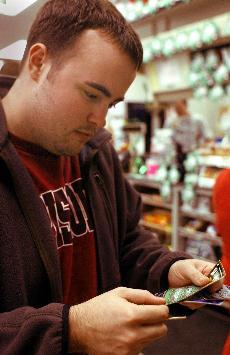
Aria Behrouzi
More than 5,000 retailers started selling lottery tickets Thursday, making North Carolina the 42nd state to have a lottery.
Sales in the first four days reached more than $12.6 million and players collected more than $4.3 million, with two winners scratching off $100,000 tickets.
In two days alone, North Carolina raised $2.2 million for education.
“Sales have been very brisk and we’re very pleased and ecstatic,” Pamela Walker, corporate communications director for the lottery, said. “We only had just a few minor glitches that we’ve been able to work through very quickly.”
Wake County has 405 stores selling lottery tickets — 45 Food Lions, 35 Han Dee Hugoses, three stores in Crabtree Valley Mall and numerous mini-marts — the most in any North Carolina county.
Gov. Mike Easley signed the North Carolina State Lottery Act into law in August, enacting the Education Lottery. Under the lottery legislation, at least 35 percent of total proceeds go to education programs; they are intended for class-size reduction, school construction and need-based college scholarships.
“Out of that 35 percent, 10 percent will go toward college scholarships for need-based students,” Walker said. “So if there’s somebody who needs assistance or needs a college scholarship, that will be very good for them.”
The total breakdown is as follows: for every dollar spent on a lottery ticket, at least 50 cents will go to prizes; no more than 15 cents will go to administrative expenses; and 35 cents will go to state educational purposes.
Lottery officials set high expectations for the first year, estimating yearly sales to reach $400 million and expecting 2,000 more retailers to apply in the coming months.
North Carolina was the last east coast state to enact a lottery. Supporters of the lottery said North Carolina was losing money because residents bought tickets from other states.
“Usually, when I came home on a weekend from my co-op, my mom liked to play the Bingo ones,” Robbie Quinn, a sophomore in mechanical engineering, said. “So I’d buy her like 10 or 20 dollars’ worth.”
Quinn said the most they won was $40 after paying for a $2 ticket.
Walker said the main reason residents should participate in the lottery is because it goes to education and it keeps the money in the state.
“If people are going to play the lottery anyway, instead of spending the money in another state they can keep that money here in North Carolina and have it benefit in North Carolina,” she said. “Otherwise, just play it for fun.”
Some groups have voiced concerns over how much North Carolina’s education system will really benefit from the lottery.
“I don’t want my 12-year-old granddaughter down in China Grove being educated with lunch money from the poorest families,” Jim Royston, the executive director of the Baptist State Convention, said on the Raleigh bureau of the N.C. Justice Center Web site.
“I’m for the neediest in our state. That’s why I don’t want them to be enticed to squander this week’s grocery money,” he said.
Quinn said he doesn’t believe the lottery is aimed at the poor but at people who have problems such as gambling.
“I can see that it may take advantage of the poor that have weaknesses like a gambling problem,” he said. “But I don’t think the N.C. Congress is trying to screw over the lower-class citizens of the state. I know plenty of middle- and upper-class people who rushed out to buy [tickets] when they came out last Thursday.”
Some lottery opponents believe ticket outlets are placed in low-income areas where people are more likely to spend money on lottery tickets.
The focus shouldn’t be on the percentage of income spent, according to the North American Association of State and Provincial Lotteries.
NASPL said the important question is whether the less affluent are spending an unduly large portion of their income on lottery tickets.
“This has undoubtedly happened in some instances just as it undoubtedly happened with junk food, athletic shoes and other consumer items,” said the NASPL Web site. “However, there is no evidence suggesting that it is anything approaching the norm. The overwhelming majority of poor people, along with the overwhelming majority of upper-income people, play with restraint and moderation.”
Lottery officials said ticket outlets are placed where there are qualifying stores.
In many cases, zoning regulations in upper-income communities regulate the development of gas stations and supermarkets, which in turn accommodate little-to-no lottery retailers.
City neighborhoods, however, have more qualifying retailers and more lottery outlets due to population density.
Other states have successfully implemented lotteries that benefit education.
Since 1987, Florida has contributed $11 billion to education. Funds from the 2002 lottery resulted in $334.8 million dollars for public schools, accounting for 3.6 percent of Florida’s total public school education operating budget.
In 1996, 1,136 people won $1 million or more playing the lottery and an additional 4,520 won at least $100,000.
NASPL compares the odds of winning a prize in the lottery to getting struck by lightning, stating that lightning killed 91 people in 1996.
“Lotteries award over $50 million in prizes in North America every day,” according to NASPL. “Lightning isn’t nearly that productive.”
Quinn said it’s probable that he will buy a lottery ticket.
“I probably will eventually,” he said. “But I’m not in a huge rush to go out and grab one.”